Best Omega 2024: How to choose the perfect Omega to suit your lifestyle
Even if you’re not a spy – or an astronaut – the 171-year-old Geneva watchmaker has you covered

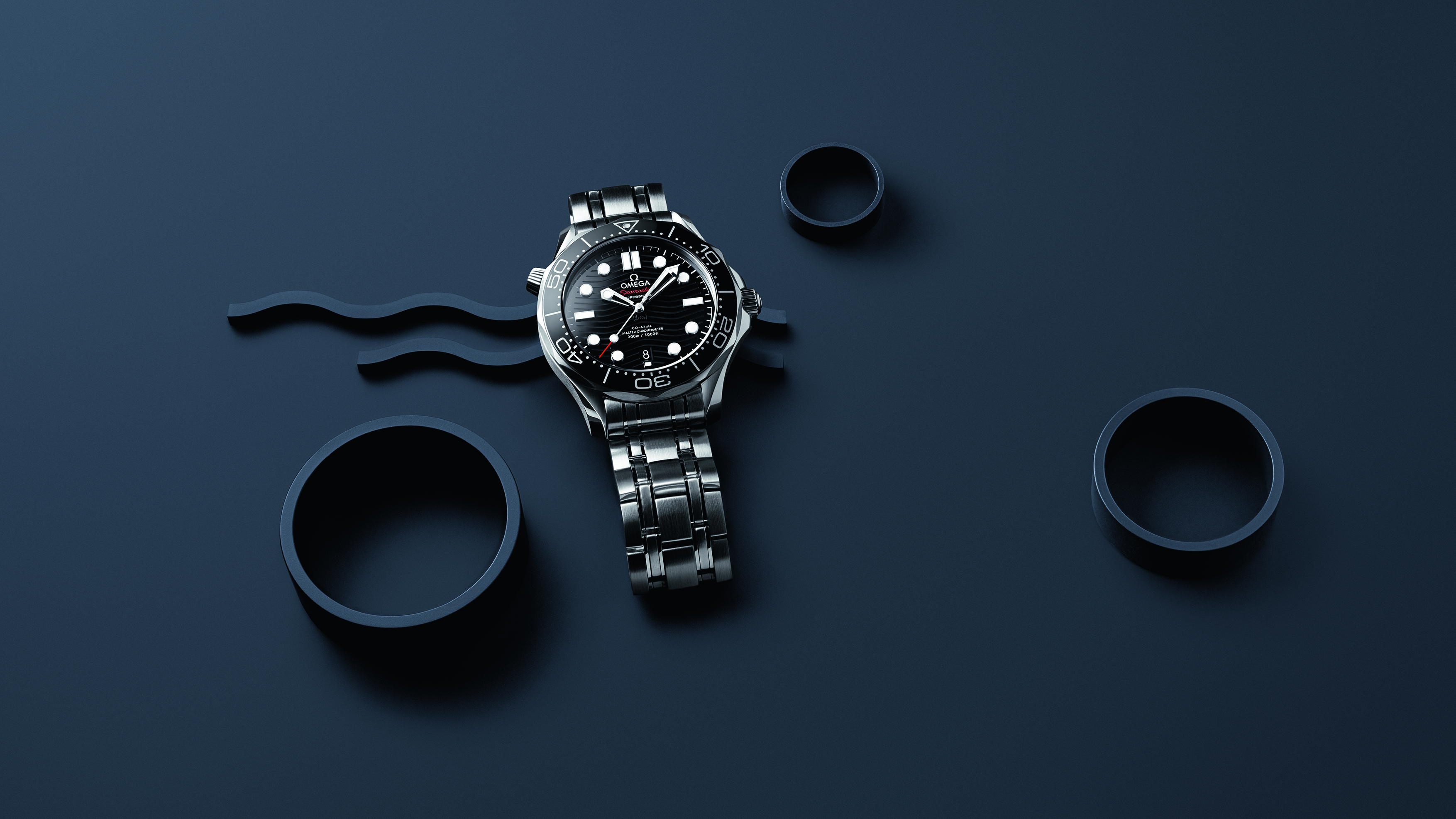
You may think that Omega has little more to offer than blue diving watches worn by James Bond, but you’d be very wrong. The Geneva watchmaker, founded in 1848, offers a wide range of wristwear for every taste and occasion.
So whether you need a watch to venture with you to the deepest points on earth, or one which can boast about being the only watch authorised by NASA for use in space, Omega has you covered. And yes, of course, you can buy one of many watches worn by a certain MI6 agent.
- T3's guide to the best watches for men
- The best watches under £1000
- 5 best watches to invest in right now
The current range spans from simple rose gold dress watches, to the world’s most capable dive watch, which can be taken to 15,000 metres. In all, Omega currently offers five collections of watch, but within these there are 21 sub-collections, ensuring you really can find something for anyone. There’s even a £70,000 pocket watch, if you really fancy it.
Without further ado, here are some of our favourites from the Omega catalogue.
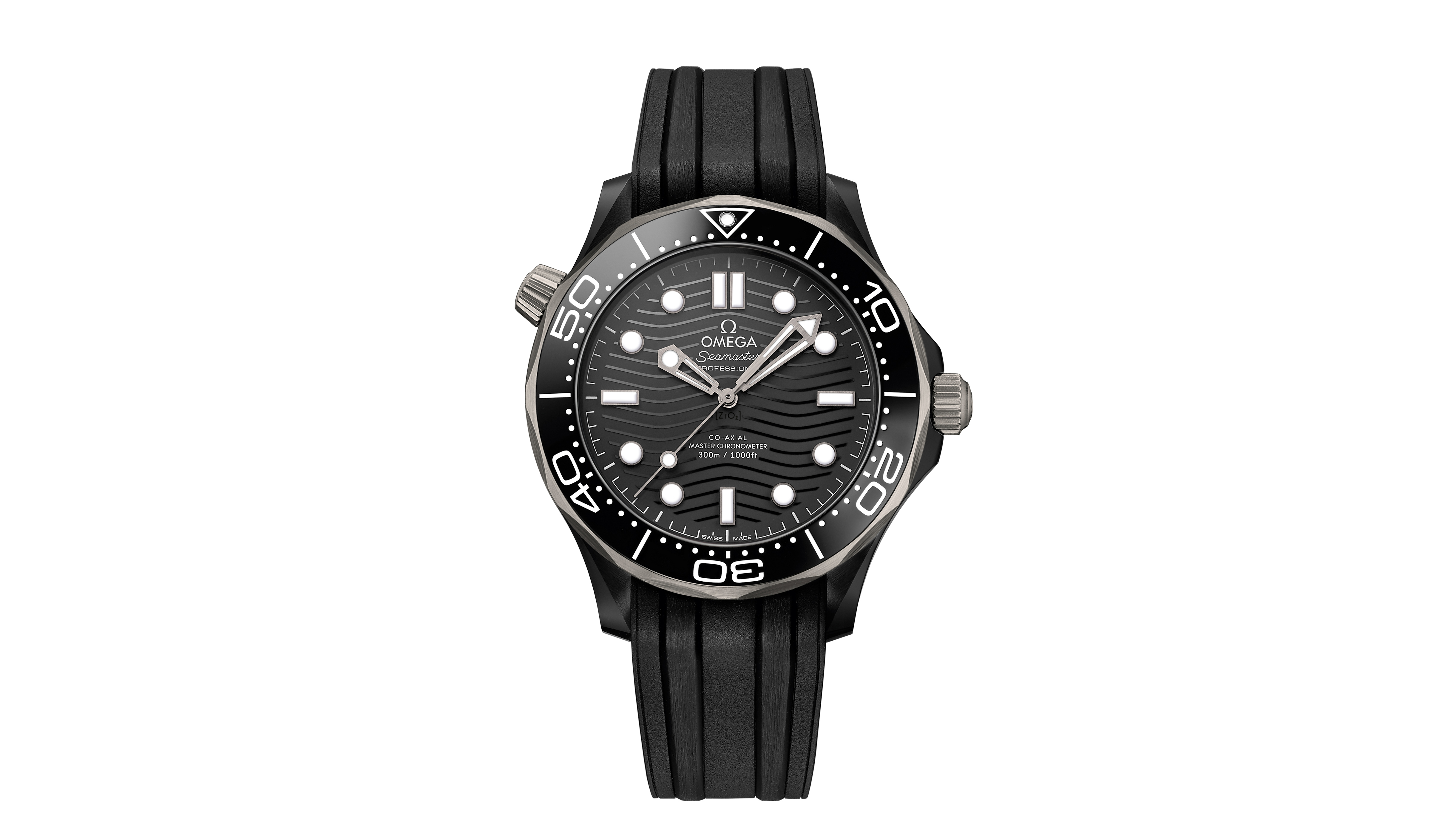
Omega Seamaster
As an indication of just how broad the Omega range is, when you search the company’s website for watches in the Seamaster collection, you are presented with 191 options.
The most recognisable member of the Seamaster family is the Diver 300m, so called due to its water resistance to 300 metres. This is also the closest you can get to the watches worn by James Bond through the Pierce Brosnan and Danial Craig years, although he has also taken to wearing a Planet Ocean 600M Co-Axial in recent years, plus the dressier Aqua Terra in Skyfall.
In Spectre, Bond wore a black Master Co-Axial 41mm on a black and grey NATO strap, and a steel Master Co-Axial 41.5mm with a blue dial and steel strap.
With their rotating bezel, luminous markers and helium escape valve, these are diving watching in the truest sense of the word. Strap styles are mostly stainless steel, but rubber and fabric NATO options are also available. Most recently, Omega has created the 007-branded Commander Watch, a Seamaster with a white dial and British Royal Navy colouring on both its bezel and NATO strap.
- Shop Omega Seamaster at Goldsmiths
- Make sure you check our Goldsmith discount codes before you buy.
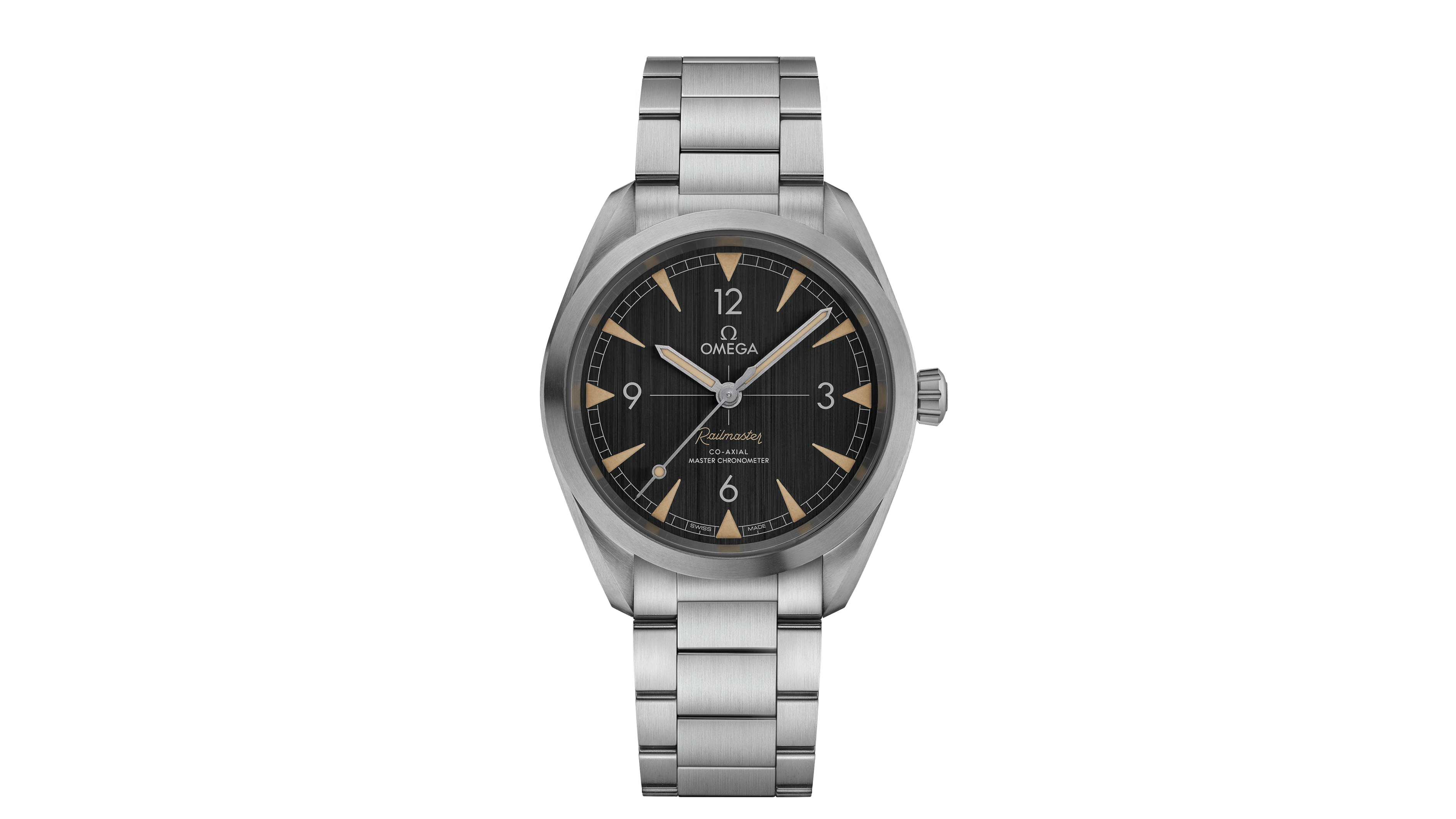
Omega Railmaster
Omega’s three most prominent professional watches are the aforementioned Seamaster, the Speedmaster (more on that later) and this, the Railmaster.
All three were launched in 1957 and have each gone on to become classic timepieces in their own way. So much so, that Omega currently sells a 60th anniversary version of each, designed to look very similar to the originals, but with today’s technology inside.
You may be forgiven for thinking the Railmaster is a watch for those working on the railways, but the timepiece was actually designed for those working close to electrical fields. The new watch’s Master Chronometer 8806 movement can resist a magnetic field of up to 15,000 gauss; for context, a regular watch can resist just 60 gauss, a small iron magnet measures around 100 gauss, and the most commonly known anti-magnetic watch, the Rolex Milgauss, is resistant to 1,000 gauss.
As with the 60th anniversary versions of the Seamaster and Speedmaster, the Railmaster has a brushed and polished stainless steel case and strap, with black dial and bronze details.
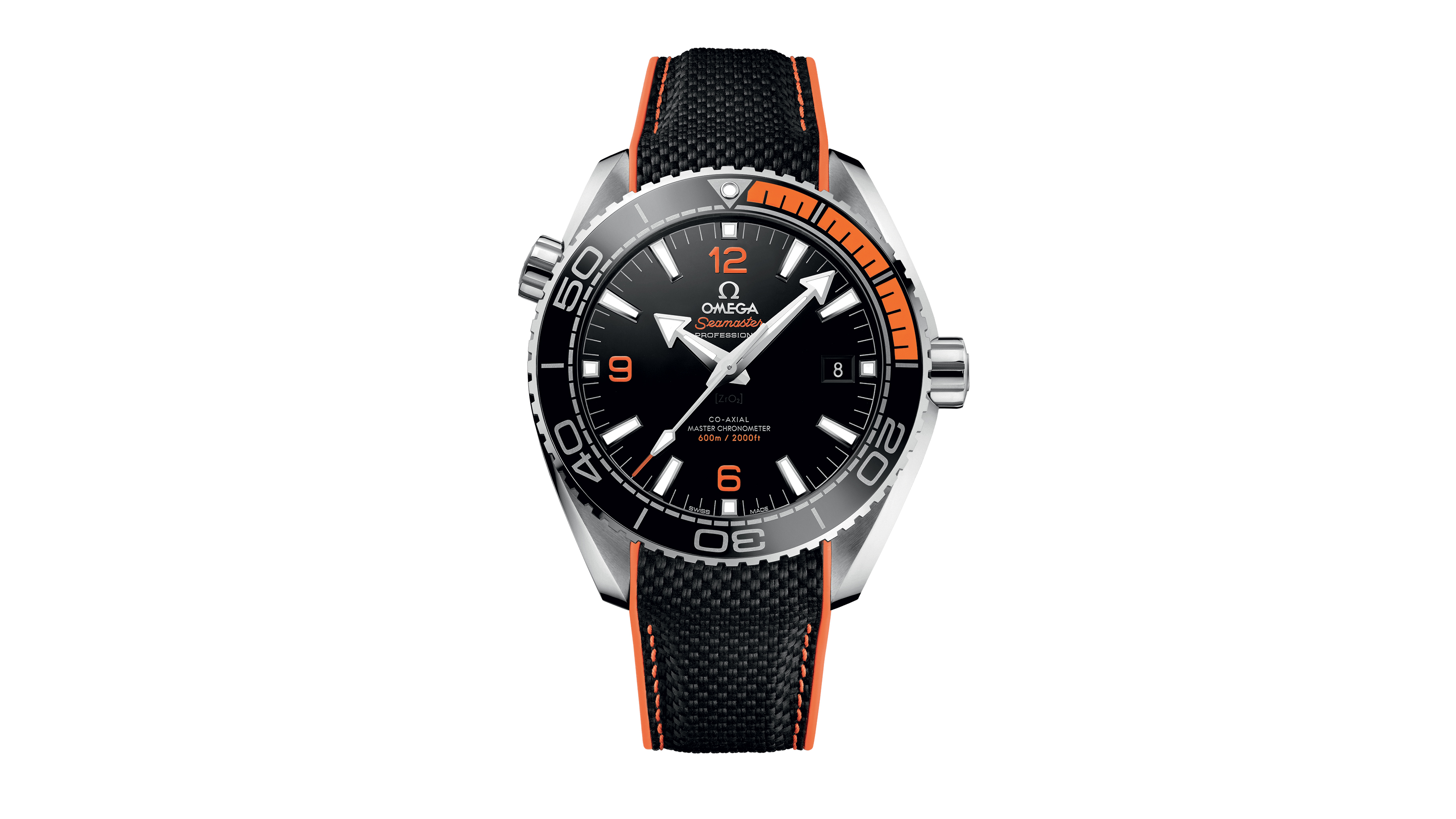
Omega Planet Ocean 600m
An upgrade on the Seamaster 300, the Planet Ocean 600m is available in sizes up to 45.5mm with a two-dial chronograph, and a body of stainless steel, titanium or 18K gold.
Adding to the kudos of this watch, the dial and bezel of the Planet Ocean 600m is made from ceramic. Legibility in zero lighting is a must for any dive watch, and taking things a step further here is how two colours of Omega’s Super-LumiNova glowing material are used; blue for most of the dial and hands, but green for the 12 o’clock marker on the rotating bezel, and the minute hand.
Colour options include subtle black with a matching leather strap, blue-on-stainless steel for the Brosnan Bond look, or bolder models with bright orange or rose gold highlights.
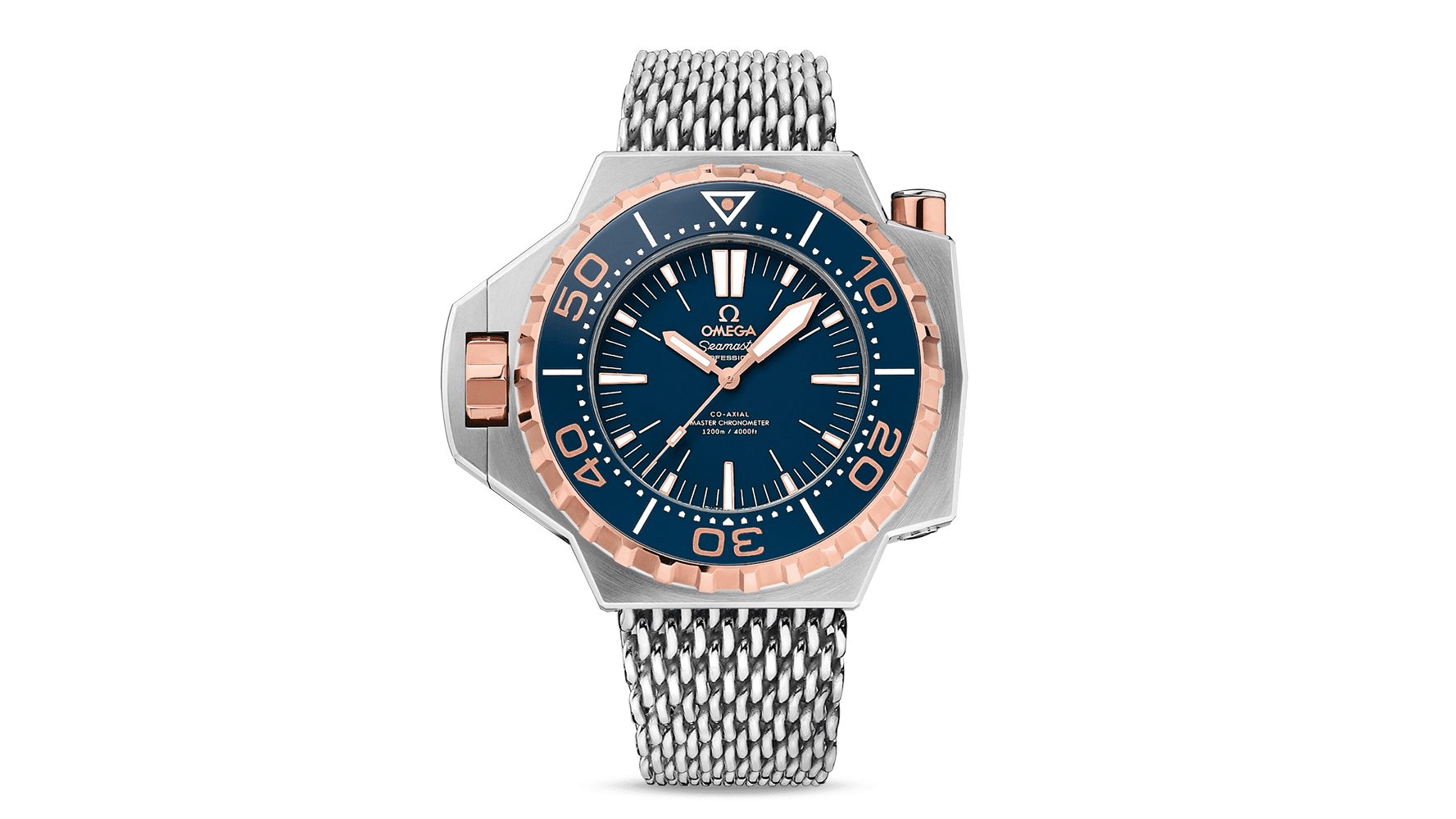
Omega Ploprof 1200m
Another diving watch from Omega, this time launched in 1970 and created to withstand far greater pressures than the more amateur-focused regular Seamasters. The Ploprof, also known as the Seamaster Professional 600, got its name from “plongeur professionnel”, which is French for “professional diver”.
Omega updated the Ploprof most recently in 2016 and gave it a magnetic-resistant Master Chronometer calibre 8912 movement, but the watch retains many design features which made the original stand out.
The biggest difference between this watch and a regular Seamaster is the crown, which is located at nine o’clock instead of three, and protected by a substantial crown guard. This prevents it from being manipulated by accident, and keeps it out of the way of whatever the diver is doing (assuming it is worn on the left wrist).
The 2016 model offers a lightweight titanium case, ceramic bezel, and is water resistant to a huge 1,200 metres, despite featuring a sapphire caseback for viewing the automatic movement. The watch also features a bezel which rotates in either direction, unusual for a dive watch, as they normally only rotate anti-clockwise. The bezel is locked and released with the plunger-style button located at two o’clock.
There’s also an automatic helium escape valve at four o’clock, through which the gas can escape after a deep-sea dive. Strap options include rubber and a brushed metal mesh Omega describes as “sharkproof”. There’s also a 26mm extension to fit the watch over a diving suit.
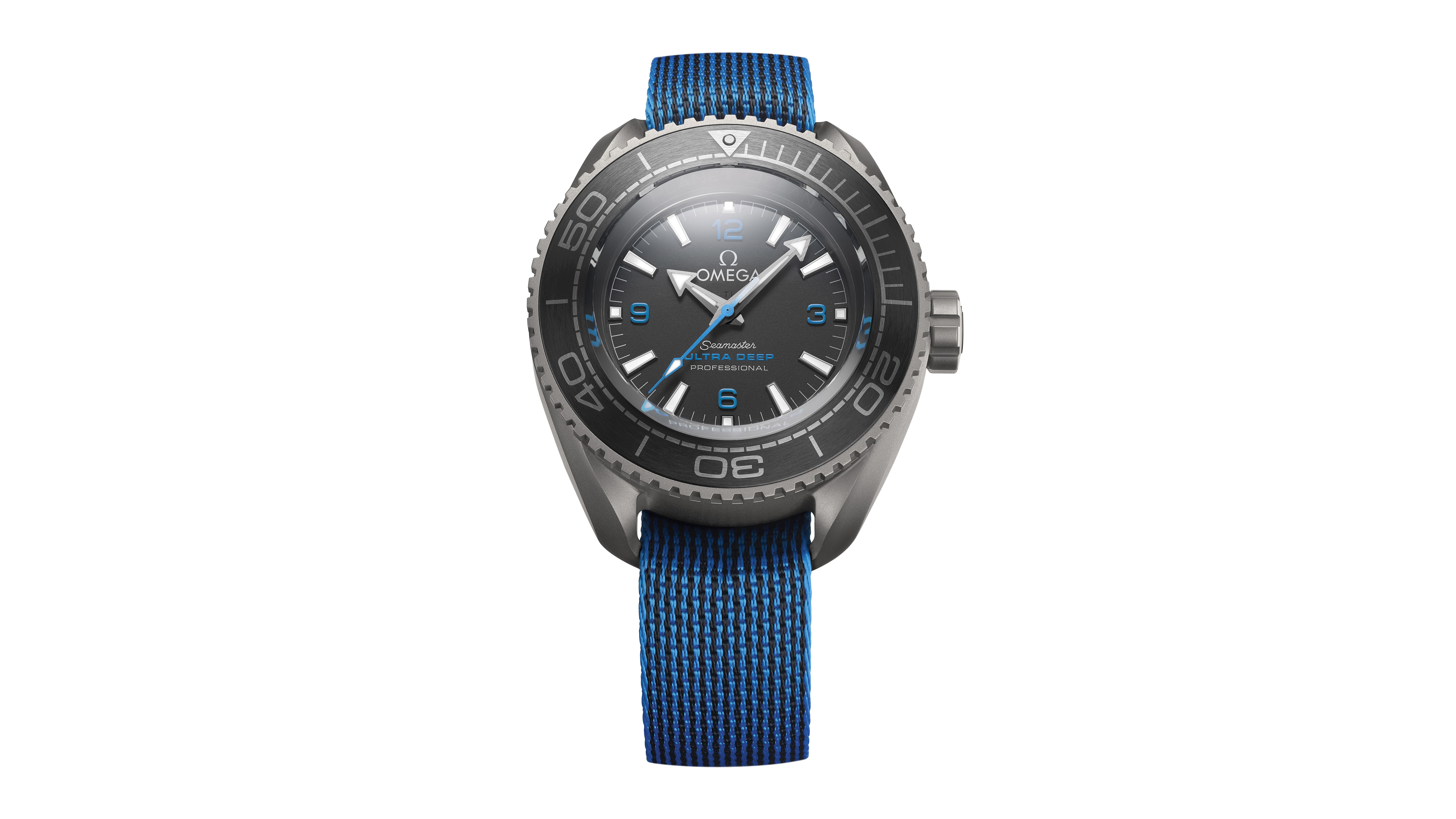
Omega Seamaster Planet Ocean Ultra Deep Professional
Omega has been producing diving watches since 1932, and started out by testing them to depths of 73 metres in Lake Geneva.
Fast-forward almost a century, and Omega’s latest model is the (deep breath) Seamaster Planet Ocean Ultra Deep Professional.
In May 2019, this watch took the record for dive watches, having survived a 12-hour mission strapped to the submersible of adventurer Victor Vescovo, which plunged 10,928 metres to the deepest point on Earth, the Marianas Trench.
Omega then added the diving industry-standard 25 percent safety margin, so the watch is actually water resistant to 15,000 metres (almost 50,000 feet), comfortably deeper than anywhere on Earth.
As you might imagine, a watch built to widthstand 16,000 psi of pressure is going to be a chunky timepiece. The Omega measures a huge 28mm thick, and the diameter is 52.5mm without the crown.
Unfortunately, this watch is not actually for sale, but the three built for Vescovo should offer hints at the design of future models, less extreme Seamaster Planet Oceans.
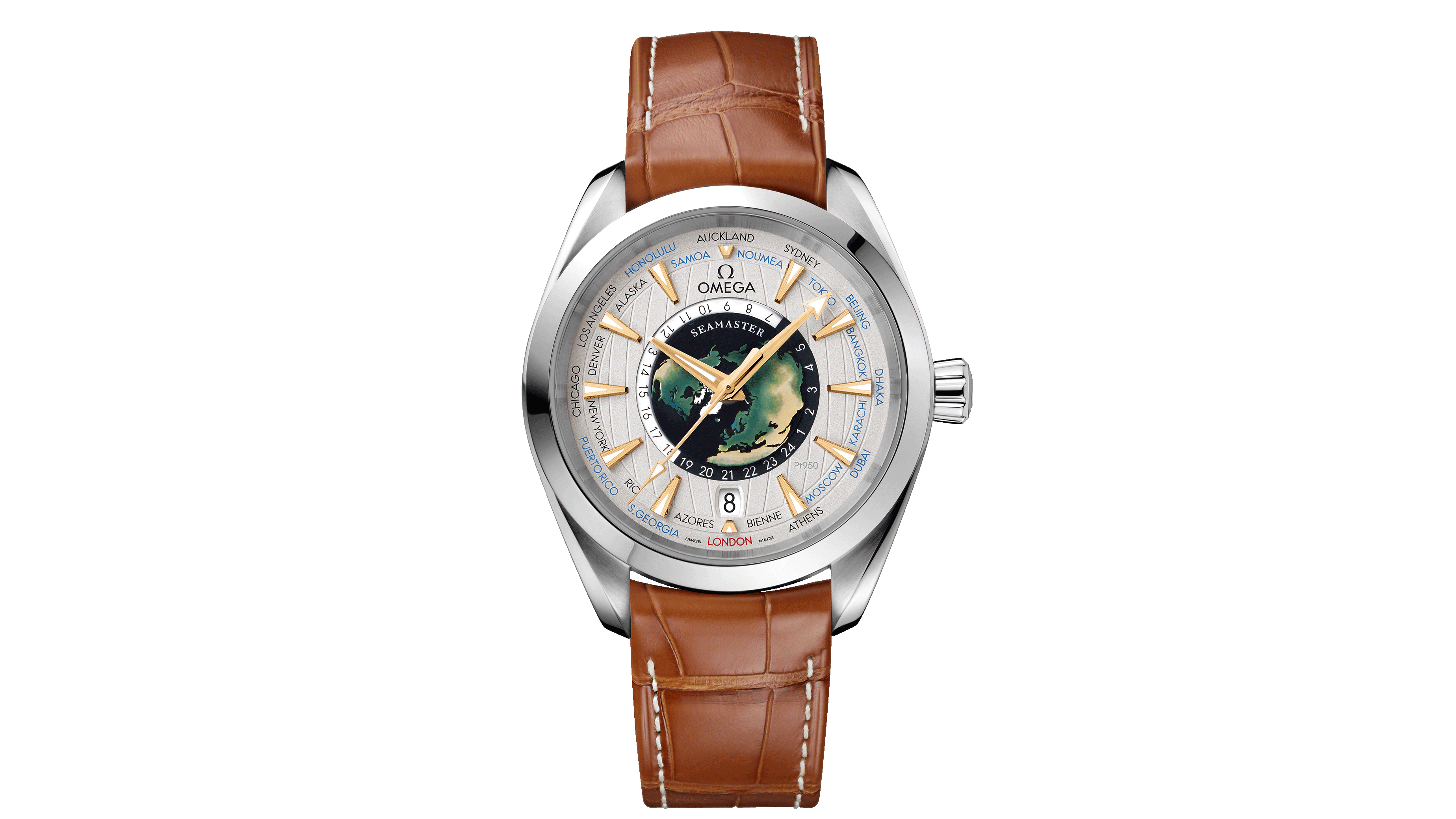
Omega Co-Axial Master Chronometer GMT Worldtimer
Now for a watch which isn’t built specifically for diving, but instead for globe-trotting. This watch still falls under the Seamaster brand, but ushers in a new name, the Worldtimer.
The Worldtimer is a 43mm watch with an automatic movement offering up to 60 hours of power reserve. The face includes various cities around the world (including Omega’s home of Bienne), arranged in order of timezone; cities in black comply with daylight saving hours, cities in blue do not, and London is printed in red to signify GMT.
At the watch’s centre is a sapphire crystal dial with a hand-crafted enamel world map, surrounded by a 24-hour indication.
The Worldtimer is available in a range of colors from December 2019, while a platinum model on a brown leather strap is limited to just 87 examples.
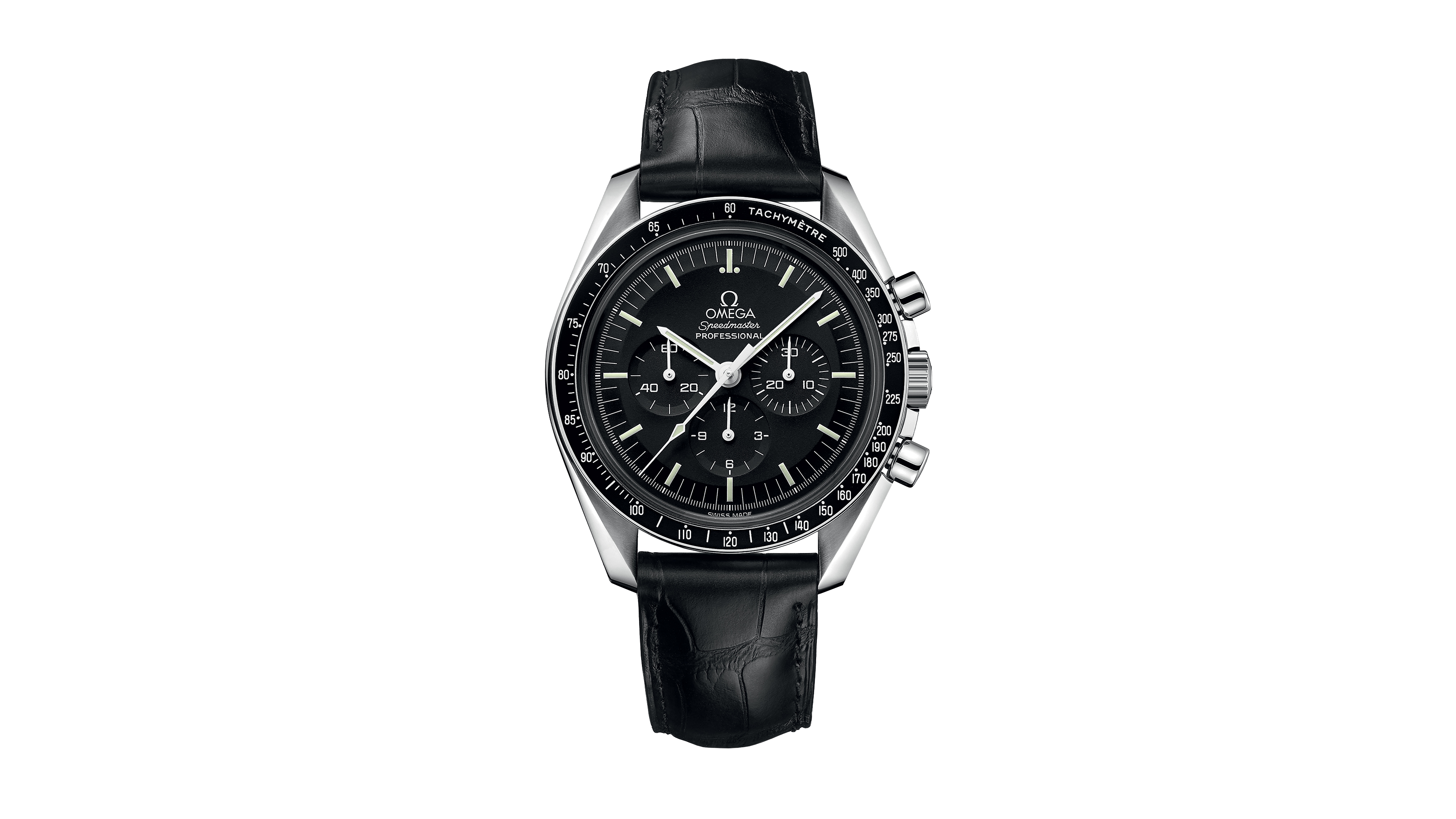
Omega Speedmaster Moonwatch
Born in 1957, the Speedmaster was originally designed as a watch for motoring. As such, the tachymetre on its non-rotating bezel is used to calculate the average speed of a vehicle travelling across a known distance.
But when, in 1962, US astronauts Walter Schirra and Gordon Cooper bought themselves a Speedmaster each for personal use at work, the watch’s entire reason for being switched from the race track to the space race.
The watch, along with others from Rolex and Longines-Wittnauer, were subjected to extreme testing designed to simulate life aboard a space rocket, and on the Moon.
The Omega Speedmaster came out on top, and was therefore flight-qualified by NASA. It remains the only watch in the world to be so, and as a result the watch’s design has remained almost completely unchanged since it was worn on the Moon in 1969.
Buy a Speedmaster today and it comes with three straps; one in leather or stainless steel (your choice), plus a fabric NATO strap, and a velcro extension strap - for wearing the watch over the sleeve of your spacesuit, of course.
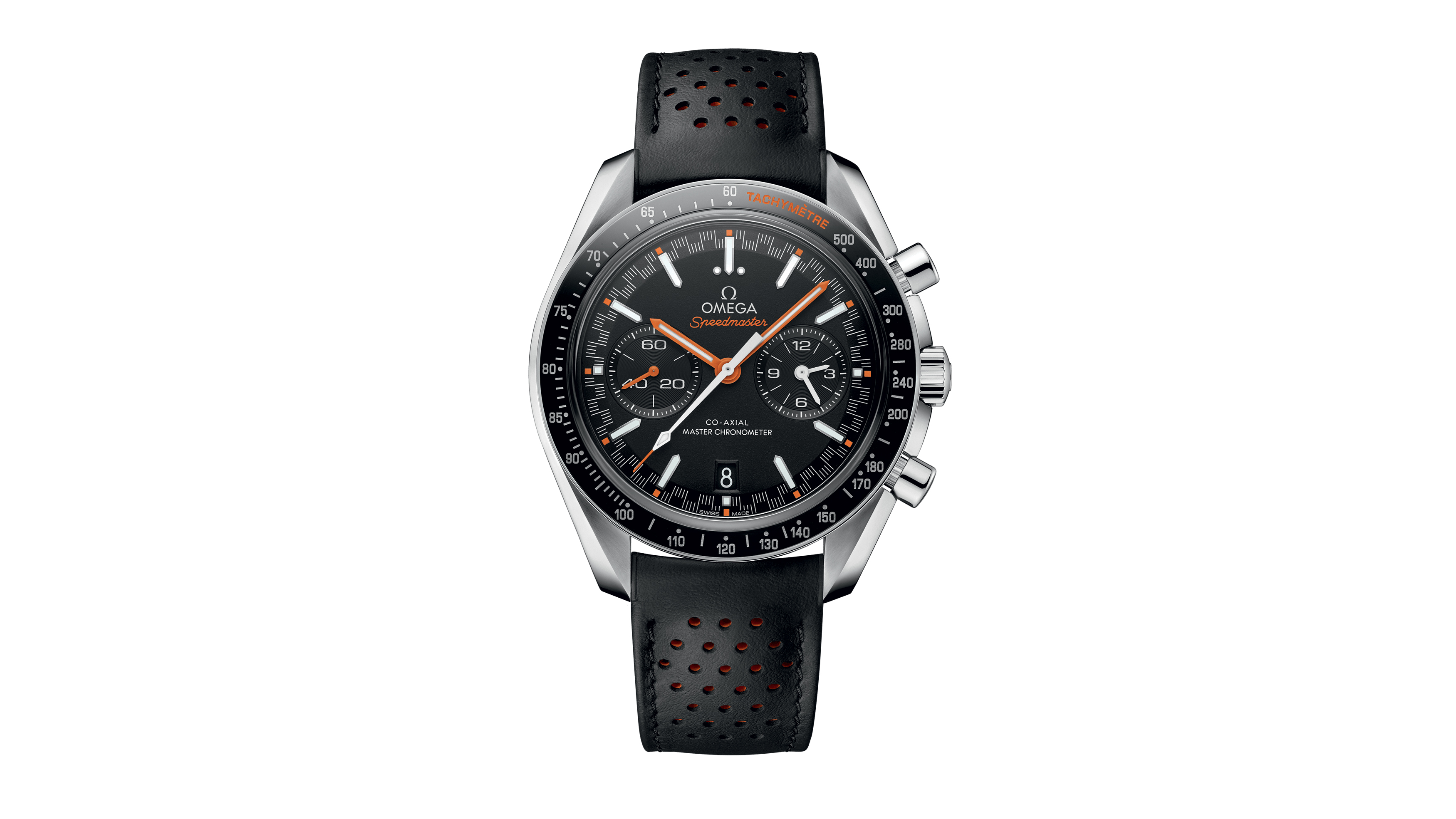
Omega Speedmaster Racing
The Speedmaster is now best now for its use by the Apollo space missions, but this Racing model takes the watch back to its motorsport roots. The watch has a large 44.25mm stainless steel case with a black ceramic bezel housing the watch’s famous tachymetre, this time with orange wording to match the hands, hour markings and strap perforations.
Unlike the Moonwatch, this Speedmaster has a date complication at six o’clock, and the perforated strap of this particular model gives it a classic racing feel. There is also a transparent case back (also missing from the Moonwatch, due to NASA qualification), offering a view of the self-winding Co-Axial Master Chronometer 9900 movement with 60 hours of power reserve.
Like the Railmaster, the Speedmaster Racing is resistant to magnetic fields of up to 15,000 gauss, which is far higher than the anti-magnetism properties of most other watches.
The Racing is also available with white and stainless steel dials, and on straps of stainless steel, or black and brown leather. Finally, there is a model with a rose gold case and tachymetre detailing, plus a blue dial, bezel and leather strap.
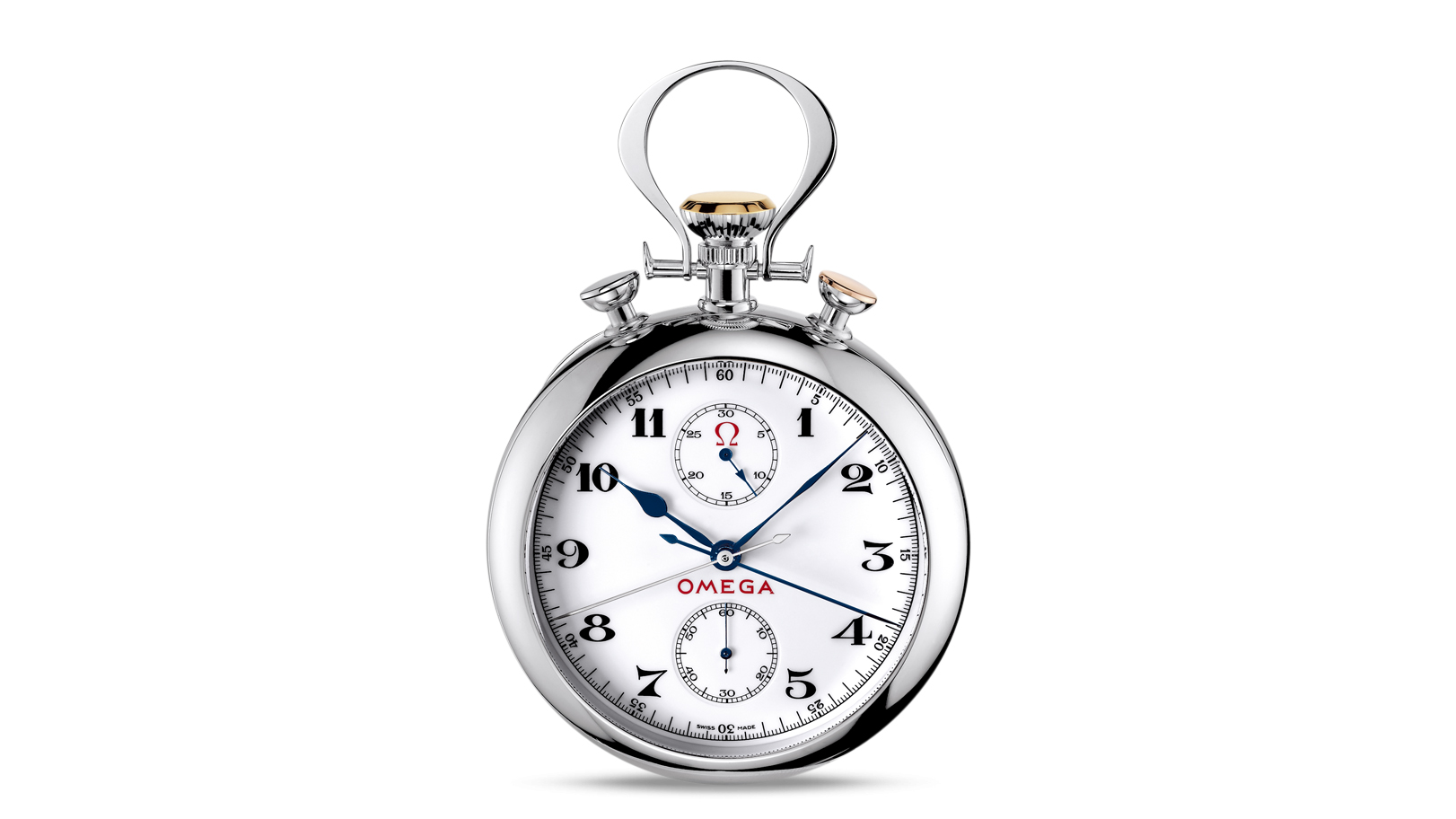
Omega Olympic Pocket Watch 1932
Now for something a little different from Omega, and the 70mm Olympic Pocket Watch 1932 Rattrapante Chronograph.
Made from 18K yellow, white or red gold, these pocket watches are powered by movements which were recently discovered in Omega’s Biel headquarters, where they had been stored, unused and unassembled, since 1932. These hand-wound movements, which have a 32-hour power reserve, were then reconditioned and used in an “enhanced replica” of stopwatches used to time the Los Angeles 1932 Olympic Games.
Omega has made 300 of these, with 100 in each colour of 18K gold, symbolising the gold, silver and bronze medals the original pocket watches played a part in deciding. They also feature a white enamel dial and the five-ring Olympic Games logo on the back, along with the inscription “Official Timekeeper of the Olympic Games”.
One for the (well-heeled) Omega collectors, each of these pocket watches is priced at £72,520.
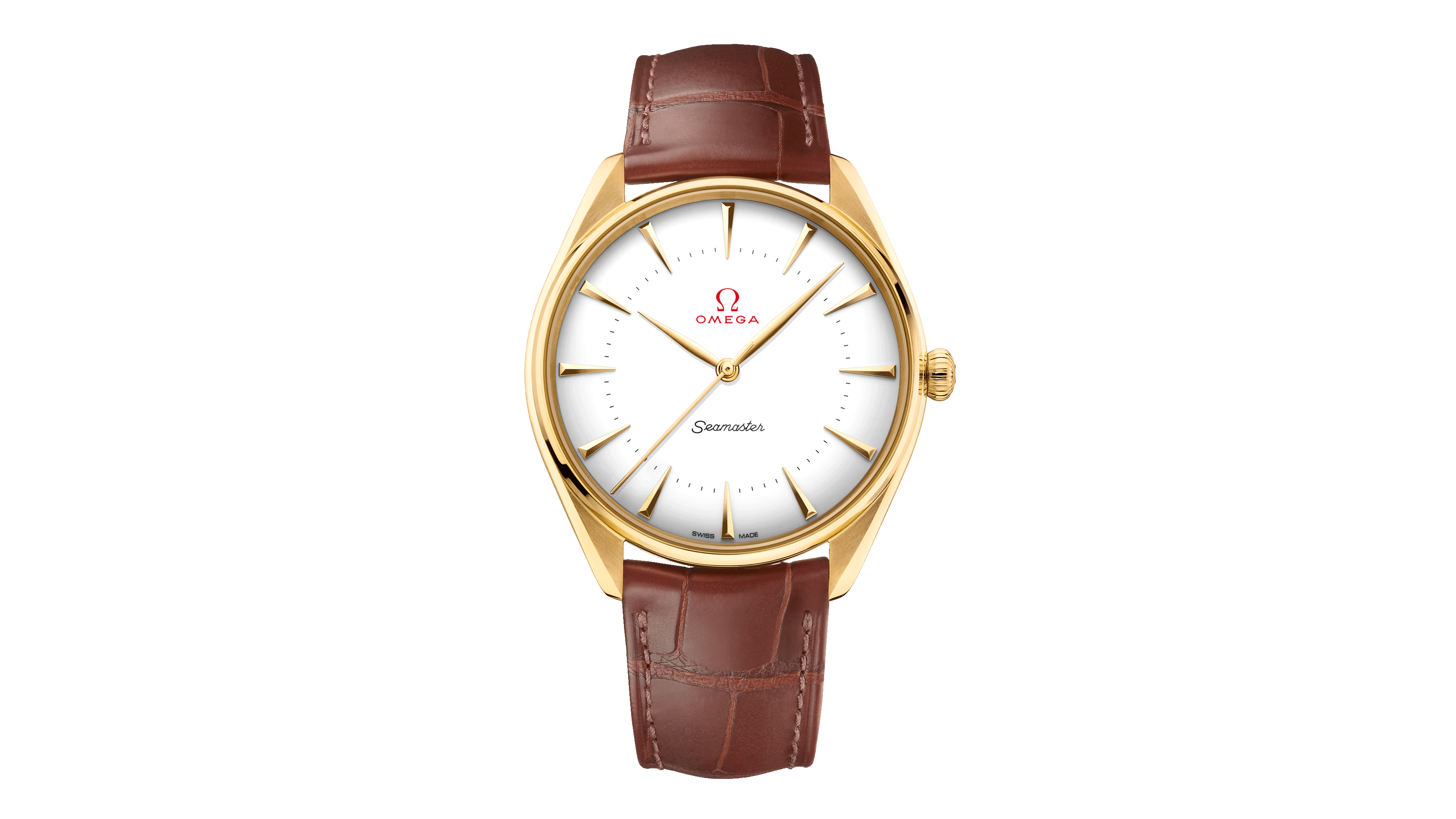
Omega Olympic Official Timekeeper
Finally, and with a further nod to Omega’s work in Olympic timekeeping, this slim 39.5mm watch features an 18K gold case with a black leather strap and transparent case back.
The back of the watch is particularly interesting, with the five-ringed Olympic logo at six o’clock, and every host city of the summer and winter games which Omega has been involved with, along with their year, inscribed around the sapphire crystal. The cities start at Los Angeles 1932 and extend ahead in time to Los Angeles 2028.
The watch is powered by a Master Chronometer calibre 8807 self-winding movement with resistance to magnetic fields up to 15,000 gauss and a power reserve of 55 hours. Water-resistance is 60 metres.
Liked this?
- Check out the best Rolex
Get all the latest news, reviews, deals and buying guides on gorgeous tech, home and active products from the T3 experts
Alistair is a freelance automotive and technology journalist. He has bylines on esteemed sites such as the BBC, Forbes, TechRadar, and of best of all, T3, where he covers topics ranging from classic cars and men's lifestyle, to smart home technology, phones, electric cars, autonomy, Swiss watches, and much more besides. He is an experienced journalist, writing news, features, interviews and product reviews. If that didn't make him busy enough, he is also the co-host of the AutoChat podcast.
